Scientific Publications of the Cologne Institute for Economic Research: IW-Trends, IW policy papers, IW-Analysen, IW-Studien, IW-Reports, IW-Kurzberichte and Expertises. Read more about our Approach to Research.
- Home
- Studies
Studies
- Anger, Christina
- Bach, Helena
- Bakalis, Dennis
- Bardt, Hubertus
- Bergmann, Knut
- Beznoska, Martin
- Bolwin, Lennart
- Burstedde, Alexander
- Busch, Berthold
- Bähr, Cornelius
- Büchel, Jan
- Decker, Mareike
- Demary, Markus
- Demary, Vera
- Deschermeier, Philipp
- Diermeier, Matthias
- Dietz, Annette
- Engels, Barbara
- Engler, Jan Felix
- Enste, Dominik H.
- Ewald, Johannes
- Fischer, Andreas
- Flake, Regina
- Fremerey, Melinda
- Geis-Thöne, Wido
- Gerards Iglesias, Simon
- Godesberg, Justina
- Goecke, Henry
- Grömling, Michael
- Haag, Maike
- Hafemann, Klaus
- Hammermann, Andrea
- Henger, Ralph
- Hentze, Tobias
- Hickmann, Helen
- Hünnemeyer, Vanessa Rebecca
- Hüther, Michael
- Jansen, Anika
- Kauder, Björn
- Kempermann, Hanno
- Kestermann, Christian
- Kirchhoff, Jasmina
- Kohlisch, Enno
- Kolev-Schaefer, Galina
- Koppel, Oliver
- Kremers, Corinna
- Kroke, Thorsten
- Kunath, Gero
- Kurtenacker, Andrea
- Körbel, Markus
- Küper, Malte
- Kürten, Louisa Marie
- Lang, Thorsten
- Lehr, Judith
- Lesch, Hagen
- Lichtenthäler, Sarah
- Malin, Lydia
- Matthes, Jürgen
- Mertens, Armin
- Metzler, Christoph
- Monsef, Roschan Pourkhataei
- Neligan, Adriana
- Niehues, Judith
- Oberst, Christian
- Obst, Thomas
- Parthie, Sandra
- Pierenkemper, Sarah
- Pimpertz, Jochen
- Plünnecke, Axel
- Pohl, Pauline Anna
- Potthoff, Jennifer
- Puls, Thomas
- Risius, Paula
- Rusche, Christian
- Röhl, Klaus-Heiner
- Sagner, Pekka
- Schaefer, Thilo
- Scheufen, Marc
- Schmitz, Edgar
- Schröder, Christoph
- Schumacher, Simon
- Schäfer, Holger
- Schüler, Ruth Maria
- Seele, Stefanie
- Seyda, Susanne
- Sommer, Julian
- Stettes, Oliver
- Stockhausen, Maximilian
- Suling, Lena
- Sultan, Samina
- Südekum, Jens
- Taft, Niklas Florian
- Tiedemann, Jurek
- Vahlhaus, Isabel
- Vogel, Markus
- Vogel, Sandra
- Voigtländer, Michael
- Wendt, Jan
- Werner, Dirk
- Wildner, Julia
- Wörndl, Daniel
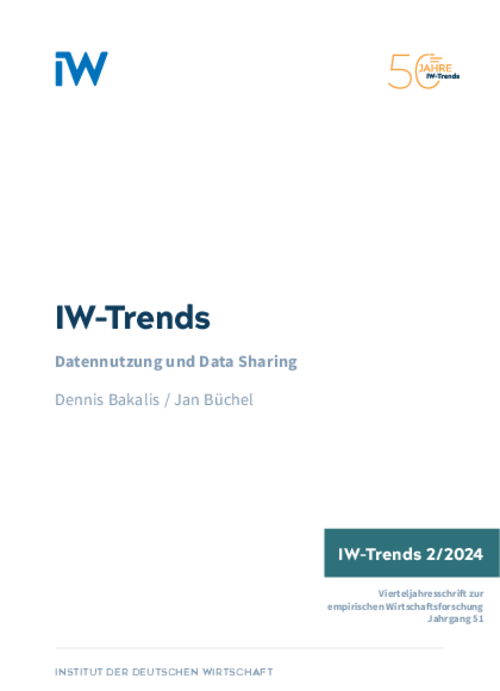
Data Utilisation and Data Sharing: The Potential and the Reality in German Companies
Companies that store their data extensively in digital form, process it in a structured manner and use it in a variety of ways can become particularly efficient members of the data economy.
Dennis Bakalis / Jan Büchel IW
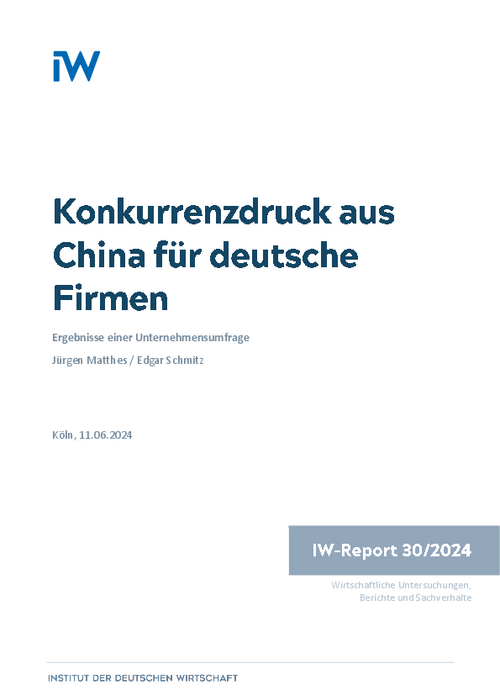
Competitive pressure from China for German companies
A firm survey conducted in March/April 2024 as part of the IW-Zukunftspanel among around 900 German companies from the manufacturing and industrial services sectors shows that around 350 of the companies surveyed have Chinese competitors in their markets.
Jürgen Matthes / Edgar Schmitz IW
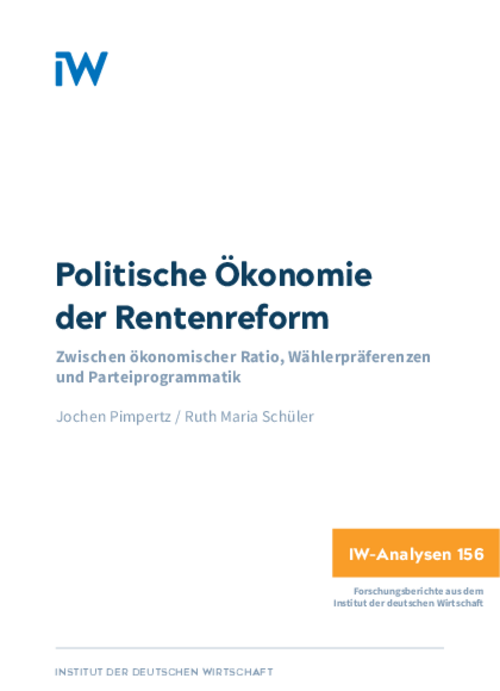
The Political Economy of Pension Reform
As the German population ages, the country’s statutory pension scheme, which is financed on a pay-as-you-go basis, requires higher and higher contributions while the level of pensions is falling.
Jochen Pimpertz / Ruth Maria Schüler IW
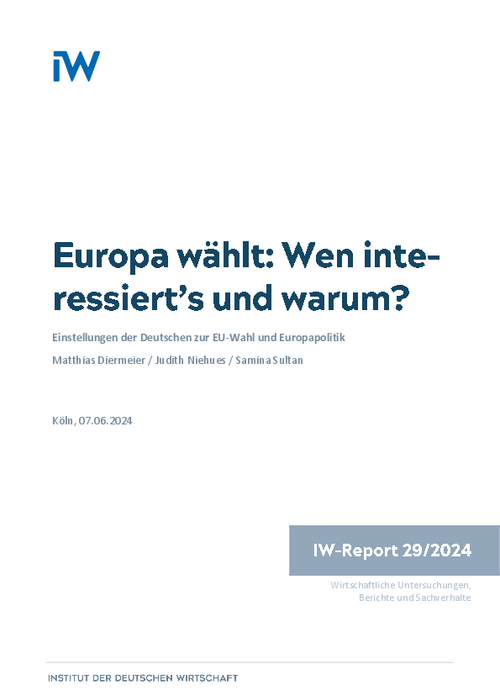
Europe votes: Who cares and why?
This study, based on the IW-People Survey 2024, shows that around 62% of Germans consider the election of the European Parliament to be important. This is the result of around 5,200 respondents. The proportion is therefore roughly as high as the voter turnout in 2019.
Matthias Diermeier / Judith Niehues / Samina Sultan IW
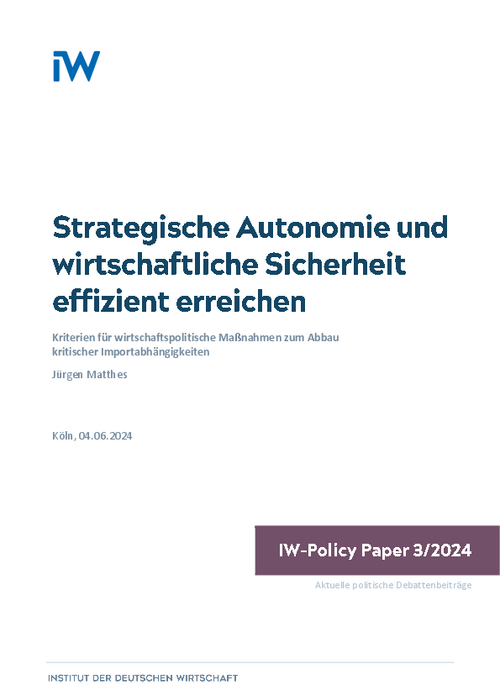
Strategic autonomy and economic security achieve efficiently
In this study an analytical scheme is developed to operationalise the objective of strategic autonomy in a cost-effective way.
Jürgen Matthes IW
Intellectual property and fourth industrial revolution technologies: how the patent system is shaping the future in the data-driven economy
Using the classification system from the European Patent Office (EPO), we identify almost 600,000 patent applications for fourth industrial revolution technologies from 1986 to 2015.
Armin Mertens / Marc Scheufen in European Journal of Law and Economics IW
The Law and Economics of the Data Economy: Introduction to the Special Issue
This article intends to provide a framework to better understand the economic problems and legal challenges resulting from the transition of the European economy to a data economy.
Thomas Eger / Marc Scheufen in European Journal of Law and Economics IW
Special Issue: The Law and Economics of the Data Economy
This special issue on “The Law and Economics of the Data Economy” for the “European Journal of Law and Economics” collects 8 contributions from 15 authors of 7 countries (Belgium, Hungary, Italy, France, Germany, Switzerland and USA).
Thomas Eger / Marc Scheufen (Eds.) in European Journal of Law and Economics IW
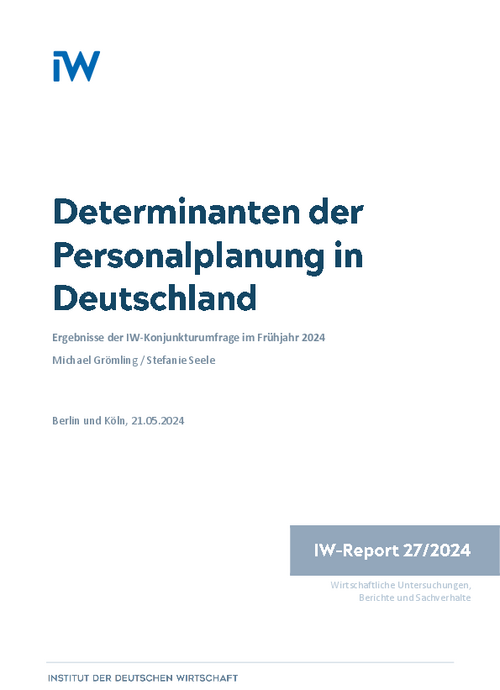
Determinants of personnel planning in Germany
The German labor market has been growing since 2005. The dip in the wake of the coronavirus pandemic between 2020 and 2022 is an exception, as the German labor market has reached a record level of 45.9 million people in employment by 2023.
Michael Grömling / Stefanie Seele IW
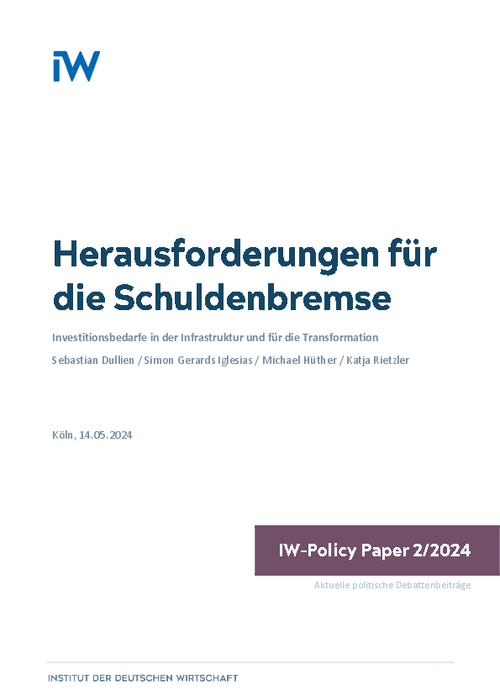
Challenges for the debt brake
In 2019, Bardt et al. (2019) initially presented a comprehensive estimate of the unmet public investment needs in Germany not covered in household planning at the time, totaling around €460 billion over ten years.
Sebastian Dullien* / Simon Gerards Iglesias / Michael Hüther / Katja Rietzler* IW
Your search returned an incorrect status. You may have selected too many filters. You can jump back to your previous selection to adjust your search.
Understanding Science
- The scientific work of the German Economic Institute is independent and solution-oriented, internationally networked and socially relevant, methodologically open and interdisciplinary. We address the scientific discourse of experts, the general public as well as opinion leaders in politics, business and society. We want to be an audible voice in the economic policy discourse in Germany.
- Our work is innovative and confronts the scientific discourse: On the basis of scientifically recognized standards, we apply new methods, use new data sets, discuss new arguments and provide solution-oriented answers to current questions in economic analysis and economic policy. Our statements are theoretically founded and, where it is methodologically and empirically possible, evidence-based. We ensure that both the data basis and the methodological approaches are comprehensible. Modern methods of empirical economic and social research are as much a part of our tools as in-depth analyses of the institutional and political-economic conditions of economic developments.
- We do not exclude any theoretical and methodological approach, because diversity and competition promote progress in the sciences. The decisive factor is not a traditional paradigm, but whether and how a scientific approach leads further in the search for decision-guiding and action-relevant knowledge. Our research is not limited to economics, but is connectable to the debates and insights of other disciplines, such as ethics, history, education, political science, psychology, law, and sociology.
- Our research is aware of its normative conditionality. Every science of human social action requires a normative clarification of the concept of man. Freedom and (co-)responsibility are the central values for us. We see the human being as a being capable of freedom and responsibility, who in this sense is enabled and called upon to competent decisions and actions. In our view, open, liberal and democratic societies require a liberal and competitive economic order that counts personal responsibility and shared responsibility among its constitutive elements.
With our new newsletters on the following topics you no longer have an IW publication.
We send out our topic-specific newsletters every month.
Register here
With our new newsletters on the following topics you no longer have an IW publication.